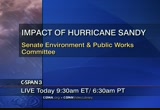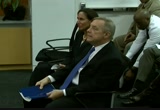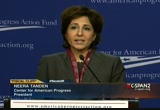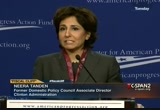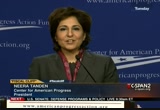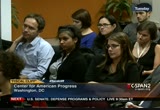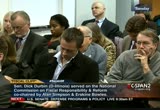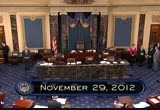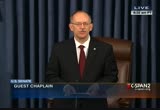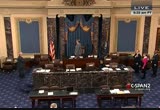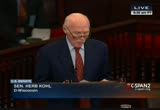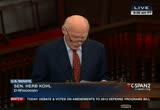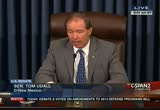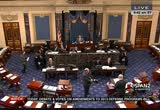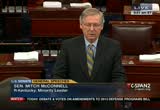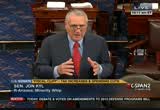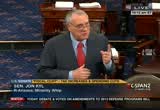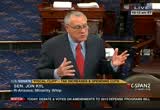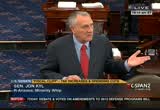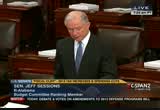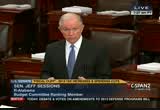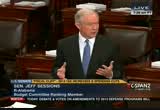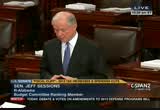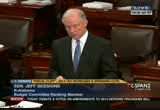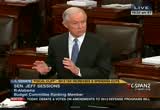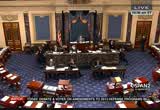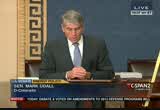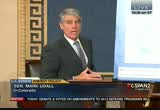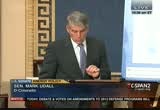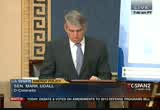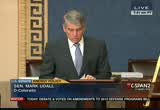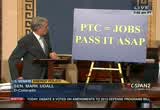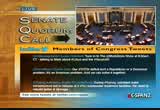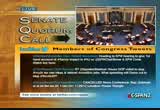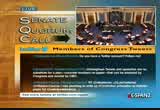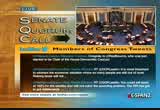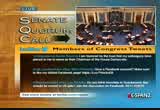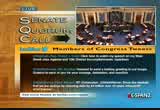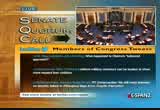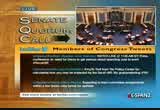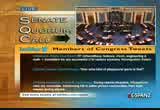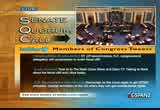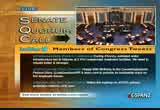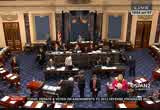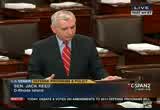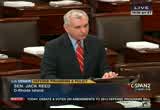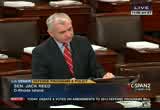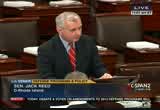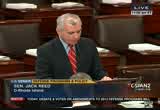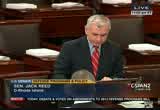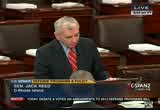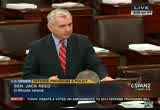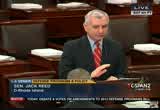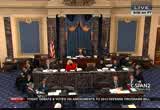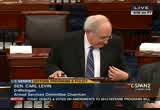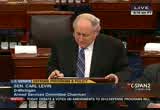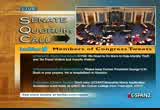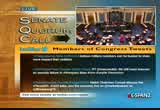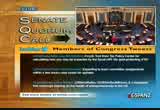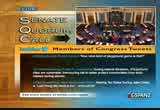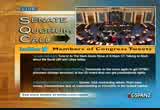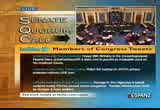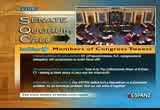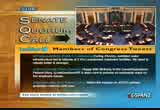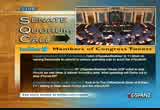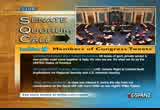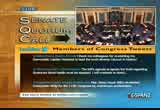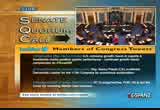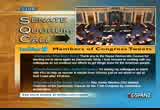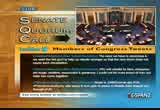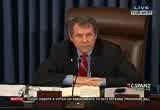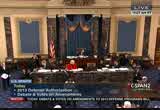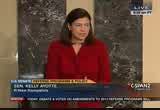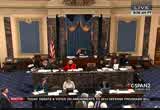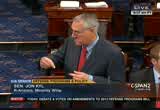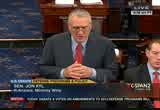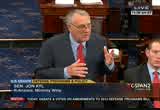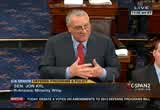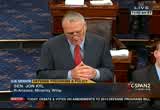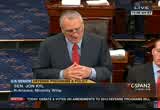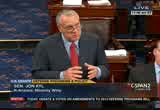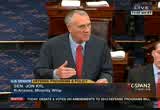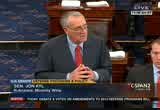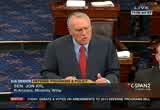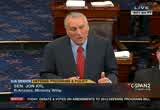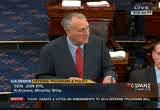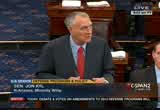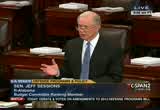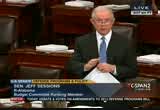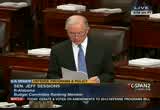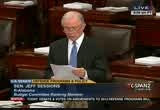tv U.S. Senate CSPAN November 29, 2012 9:00am-12:00pm EST
9:00 am
coming up today on c-span networks. on capitol hill, the senate if i'm and public works committee will convene a hearing on hurricane sandy and its impact on local communities with testimony from congressional members who represent the hardest hit areas in new jersey, new york and rhode island. i would be live at 9:30 a.m. eastern. you can see that on c-span3. later, the house oversight and reform committee on rising autism rates. according to a study published monday in the archives of general psychiatry, exposure to air pollution during pregnancy may increase the likelihood of a child developing autism. that hearing will be live starting at 2 p.m. eastern, also on c-span3. here on c-span2, the u.s. senate gavels in and about half an hour at 9:30 a.m. eastern. they are expected to continue working on the 2013 defense programs policy bill, possible debate on 100th a minute and "roll call" votes happening throughout the day. senate lawmakers also continuing
9:01 am
work on the floor on the fiscal cliff. majority whip senator dick durbin spoke about bipartisan negotiations to try to avoid the fiscal cliff at an event earlier this week at the center for american progress. we will show you as much of this as we can into the senate gavels in at 9:30 a.m. >> we are thrilled to have senator durbin to talk about his views on the fiscal cliff, and the framework. i think as we engage in this debate i just want to let a few things that are critical. as washington becomes obsessed with this issue. first and foremost, i think it will have consequences and that cap we have argued that the issues that are really framing the fiscal debate and fiscal cliff are ones that were actually dictated in the election context. the president didn't have one
9:02 am
set of complications, and a second set now. really there was a thread going through the debates as was happening to add that thread was about having a balanced plan that addressed america's fiscal challenges. acknowledged there were serious fiscal challenges that we do need long-term, deficit reduction. that's important for america's credibility, and it's important for america's economy and economic growth. that plan has to be balanced and that means significant revenues, and it has to go around. typically that means the wealthy and well off have to pay their fair share as well. again, these are not new issues. they are ones that were debated. they came up in every debate. even foreign policy debate. and so we think that the american people are on the side of the president and democrats. that is not to say --
9:03 am
[inaudible] we want to remind everyone that there's already been a trillion dollars, over a trillion dollars in spending cuts. and so that is a significant part of this debate, because it happened last year. but just because washington has a short memory doesn't mean we all should have one. and that there's already been sacrifice on behalf of through those discretionary cuts. we are particularly excited doing a lot of work on the fiscal cliff. we talked about medical savings through the programs, address rising national expenditure. will have more to say on taxes, but we are ecstatic to have senator durbin here today who has played such a fundamental role over the last several years. been part of literally every
9:04 am
negotiation that has taken place. he still an optimist, so i think that is a sign of progress. he has had a long history of being a champion and advocate for the middle class. he has carried that advocacy in the budget negotiations. part of the cu -- subcommittee, the gang of eight, became a six, almost every game that has been involved in these issues, and, but i think most importantly he has been a fighter for what's right and for having a plan that really stands true to the back of the american people and the people who voted and waited in line for hours, people who want a fair shake out of washington. and so, as a champion of that fair shake i'm excited to have senator durbin. [applause]
9:05 am
>> neera, thank you very much for those kind words your elections as you say have consequences. politics is driven by a lot of things. candids that money -- [inaudible] the center has been at the forefront of that effort to make sure that progressive ideas backed up by more than just -- but arguments of mind. thank you for doing that. i don't know what we do without you. it's an honor to be here with you. she was right. i've been involved in a lot of gang activity. i got to come clean with you. it started with harry reid of when you get to the simpson-bowles commission. 18 members. i thought this was another commission whose product will be lost in history. buried in some hard drive. but it turned out to be a
9:06 am
historic effort and the game changer. mainly through the good work of erskine bowles and alan simpson. but hard work that was put into this bite 18 members, evenly divided among house and senate, democrats and republicans. the 11th of us voted for the final work product, and then i was invited to join the gang of six to try to continue the conversation from simpson-bowles. it expanded to the gang of eight and the conversation continues as well. it's been going on for to the use. -- for two years. it was an effort to set across the table, very conservative senators, to really talk through not just the reality but the political reality of the deficit which i think we have to be more sensitive to if we are looking for an honest solution. along the way, some of my
9:07 am
friends on the left, the progressive community came to visit. i recall one in particular. a labour leader who said what is a nice progressive like you doing in a place like that? why are you hanging around with those people? you just know that they are up to no good and they aren't going to do the things that you have been elected to be. i disagreed with his person and i said given a choice between attending a press conference were walking outside with a sign, or being seated at the table, which do you think is a better place to be? ethos and he said, stay at the table. that is the reason that i've been there, because i think that i have a role to play, a voice to add that isn't going to be there otherwise. just by way of background, i ended up in politics thanks to paul, paul douglas was my first person i met in politics. phn economics, extraordinary man.
9:08 am
deserved into 1966. i was a college intern in his office. he used to say you don't have to be wasteful to be a liberal. i think we take you don't have to be wasteful but he was much more literate than me. paul simon, as you recall, well known as a liberal was also a strong supporter of a balanced budget. so there's a strain at least in progressive politics of conservatism and fiscal sanity comes to spending issues. i happen to agree with them. i believe that what we are faced now is a threat to our country, is a threat to our budget at every level. the money that we are borrowing to sustain our government is money that is borrowed to sustain food stamps as well. and we got to be thinking about in terms of our values and our future. let me speak to a couple elements here, several element
9:09 am
your that i think progressives should keep in mind. progressives cannot afford to stand on the sidelines in this fiscal cliff debate. and to deny the obvious. important critical decisions will be made soon that will affect this country for 10 years. i think we need to be part of this conversation, which means we need to be open to some topics, some issues that are painful and hard for us to talk about. we cannot stand on the sidelines in denial. if this is ever going to engage us in the things we value. we can't be so naïve as to believe that just taxing the rich will solve our problems. what i see as i live out my remarks, i believe that is an important part of the solution. we have to look to reform and change that is significant, that preserves many of the values and programs that brought us to
9:10 am
political life. and we cannot believe that merely ignoring these programs are not engaging is going to solve the problem. pick up any of the hill newspapers and look at the full-page ads, and you will see on a daily basis organizations, engage in political campaigns, buying ads basically saying the left, keep your hands off entitlements, and to the right, keep your hands off of taxes. well, if both sides heed those warnings, nothing will happen. that's not good for america. it is better for us to engage with some basic ground values and principles. and let me say what i mean by that. first, i started with the premise that we need to preserve and extend progressivity and attacks the. i think the lesson is very clear. we know what's happened to middle income families and those making less are falling further and further behind. what the president has proposed
9:11 am
and what the senate has passed in the senate, the $250,000 protection, all families making less than that would have no tax increase after the cliff, that is significant. average wage in illinois is $50,000. if we don't protect those families from the fiscal cliff, they will see their annual taxes go up $2000. for those living pay to -- paycheck to paycheck, it will be noticed. it shouldn't happen. i hope the house will take up the president's challenge with the invitation and pass the senate bill to protect families making less than $250,000 a year. with one vote, they can really avert the fiscal cliff 4908% of american families, at least when it comes to income tax. and it's necessary. we know what happened over the last several decades when it comes to progressivity, income inequality in our country.
9:12 am
it's the worst it's been in almost 90 years. through 1980 and 2005, in a 25 year period in time, more than 80% of total increase of american income went to the wealthiest 1%. since the recession ended, more than 90% of the income growth in america has gone to the top 1%, while the media income to the middle class has declined to i could go on and give illustrations. i don't think i need to. at least to this group, but i will tell you when we address the issue of revenue and taxes, i have insisted in every meeting i've been in from simpson-bowles to all the games, but it has to at least protect their current progressivity of the tax code, if not improved for those of lower income categories. i think that's a starting principle for those. the second thing is that we must insist on is to protect the safety net for america. make no mistake. as good as we are thoughtful as we may be, there will always be
9:13 am
people in this country who will need a helping hand because of physical, mental deficiency, whatever happens to be. they're going to need a helping hand to purchase the economic circumstances they find themselves in. i went to a food bank in champaign, illinois, last you. it was a warehouse but i took it to a. there was a nicely dressed lady there. i watched as she accompanied me on the two were and what it was over i thought, she must be on the board. at a stop and talk to her for a few minutes and talked about a few things. internet she worked for the local school district and she was glad to have a job. the job didn't pay much money. she was a single market she said i want to particularly thank you for the fact of the step program lets me take my kids to the family market. it's a great thing. i'm thinking there's a woman trying to very best. just a month ago i was at a food pantry in chicago.
9:14 am
i went up to lady and said, do you mind telling me your circumstances? now, she said, i'm happy to kill you. i'm on social security. how much to you get at your? >> [inaudible] spend what is your role? she said $600. [inaudible] they give me three days worth of food each month. and she said i get food stamps worth $37 a month. for many people are struggling, the working poor as well as those who are retired and impoverished state. we got to make sure at the end of the day when we talk about our budget and our deficit, we don't overlook the obvious. and that is, the safety net is absolutely essential for the future. the third element i was like to make as part of the guiding principle is that we have to get the recovery on track. it is absolutely essential that this recovery, which is moving forward slowly but forward, continue to move forward. and we know some have called
9:15 am
let's go over the cliff and watch what happens. we know if we're not careful it will, in fact, stop economic growth and hurt everyone through every income, particularly those who are most vulnerable. so we've got to make sure that as we face in deficit reduction we are mindful of the economic recovery which we're giving with your. that to me is essential. i hope, my friends, they are sitting down when it is the president obama didn't make a trillion dollar deficit. he inherited. [inaudible] with more trillion dollar deficits forecast in years to come. despite the extraordinary steps to do with a great recession, deficit as a share of the economy has actually decreased every year for the last three years. 10% of gdp in 2009, 7% gdp
9:16 am
today. the source is not the democratic national committee, but "investor's business daily." they said believe that or not, the federal deficits smaller over the past three years and it hasn't any stretch since demobilization after world war ii. outside of the post-world war ii era, the on than the up deficit has fallen faster is when the economy we left in 1937, during the great depression into -- [inaudible] u.s. district offers, testing the speed limit of the fiscal consolidation does and backfire. >> i really go back to simpson-bowles.
9:17 am
i think they had it right put. repeat, everything on the table. not only taxes, but spending cuts and entitlement reform. let me speak about each of them. first when it comes to revenue, so many people in the business community and outside have talked about simpson-bowles and how that should be basically a guideline or what we are engaged in today. simpson-bowles relied on revenue for 40% of the deficit reduction over a two-year period of time. 40%. and it's understandable when you read that report as i went through it again this morning, why they said this. because if you look back to the last year when we had a balanced budget under president william jefferson clinton, if you look back to that year you will find that at that point in time our revenues reflected 19.6% of our
9:18 am
gdp, and our spending reflected 19 points 6% of gdp. where are we today? you get different essence. warren buffett yesterday in "the new york times" said 15.5% of our gdp is coming in of revenue. i've heard lower figures, and the spending side of it is summer in the range of 22-24%. well, that to me is the reality of what has happened. we have seen a decline in tax revenue and an increase in spending for a variety of reasons we could go through. if we're serious about deficit reduction in the years to come we've got to move back towards the golden mean 19 points six. the closer we can get our revenue to 18% of level, as we weigh down spending, the more likely we are to have a stable economy in the years ahead. let's talk about what's happened since that time when we did have our budget in balance. danya in a way updates are
9:19 am
figures from time to time. but let's take a look at where we are today. compared to where we were fiscal year 2001 when the federal government actually ran the $128 billion surplus. compared to this 2001 figure, we are spending less on nonsecurity discretionary spending than we were then. in other words, the growth in spending has not been in the nondefense discretionary accounts. secondly, the cost of security programs in that same period of time since we were last in balance has up 60%. department of defense funding in the same period of time has gone up 64%. and the cost of mandatory programs after adjusting for population growth is up 30%. our revenues as a government, 15%. the spending up into categories we've mentioned. we've already passed a major
9:20 am
down payment when it comes to deficit reduction, the budget control act, about $1.5 trillion in savings into the next 10 years. but i want to call your attention to one aspect which progressives need to remind people. of the $1.5 trillion already in spending cuts, $900 billion of that comes from nondefense spending. so we have given, at least on the nondefense side, far more per deficit reduction and we've seen on the defense side. that's something to keep in mind as we talk about spending cuts in the future. let's talk about those for a minute. as i mentioned earlier, the budget control act and sequestration, if you take into account, would result in dramatic cuts to spending. we have heard a lot of talk about the impact this will have on our national defense. there isn't anybody on the left, right or center, the wants to cover much america's national
9:21 am
defense, but to believe it into one war in iraq and ended another in afghanistan and reassessing our role in the world, we cannot find savings in the pentagon i think is not a fair assessment. at simpson-bowles said and others, there are savings to be had there that would not compromise our national security. i want to also add simpson-bowles approach establish firewalls in the outer years to delay the temptation to go back into the nondefense accounts when too much political pressure keeps you out of defense spending. so i would hope that in a long-term agreement would include that. on the nondefense side, i still think there's a savings to be found. i give you a couple illustrations of those that i think might be of some value to us. first, hats off to debbie stabenow and pat roberts putting together a far build that safest $23 billion over the next 10 years. that's something that hits my state directly, but i think they
9:22 am
did it thoughtful, bipartisan job of saving money toward deficit reduction. there are other areas where savings can be found as well. and i think that we need to look at those honestly. let me kill you, i think the infrastructure is one area where we we should consider as simpson-bowles does. revenue source for dan infrastructure bank. we are not spending enough. we are not investing enough in the infrastructure of america. today, china invests 9% of its gross domestic product infrastructure. europe, 5%. america, 2.5%. barely enough to sustain and repair what we have in place. there are no grand visions ahead about infrastructure, and it should be. beyond the obvious of highways, support and airport we ought to be think about a energy infrastructure in this country and whether it serves our economy well. we have already seen some thoughtful suggestions from both sides of the aisle to take a look at that.
9:23 am
but i was a when it comes to spending in the future, we need to be thoughtful about ways to fund infrastructure. i guess many of you saw mayor rahm emanuel's article result in the "washington post" on the same subject. secondly, in the area of education i wouldn't be here today without good education and opportunity created by the national defense education act. i want to give belated thanks to the soviets for launching sputnik and scaring the hell out of the u.s. economist because as result of it they created a loan program that got me into college law school. we can't give up on that. this kid from east st. louis illinois and for many others, these loans make a big difference whether it's pell grants or loans, but let's look at this honestly. 25% of the federal aid to education goes to for-profit schools. they have 12% of the students, 25% of the federal aid to education, and more than double the student loan default rate of any other class higher
9:24 am
education. there are ways to cut back in spending in education particularly as is wasted on some of the schools that will give us opportunities for resources for real education. which can be part of our future. now let me come to the most painful topic of all, entitlements. social security was included in the simpson-bowles report but i didn't agree with every aspect of it, but i thought that was a sensible approach to breathing life into social security beyond its current longevity. i also like and it to 82 when asking your, and 83 and was told that social security is on its way out in six months, we'll be out of money. so we rolled up our sleeves, came up with a bipartisan solution, with speaker audio and president reagan, that ultimately bought over 50 years of solvency for social security. what did we do? we raise retirement age. we raise the payroll taxes on social security, and we tax social security benefits for the first time and we bought more
9:25 am
than 50 years of solvency. today, social security untouched unamended will make every promise payment for the next 22 to you can't say that about much of washington, can you? but in social security you can pick out at social security is not added 1 penny to the deficit. for those who say good reason to push it off the table and wait till another day, i would add a note of caution. small changes made to date in social security will play out over the long run to buy of solvency for a long period of time. i think we should take social security off the table for the current fiscal cliff and deficit discussion, but be very honest about what we are going to achieve in the near-term. i think we should create the equivalent of a simpson-bowles commission for social security, and give them eight months to figure directive to come up with a plan to buy 75 years of solvency in social security. and then render to the floor for a vote and allow any bipartisan
9:26 am
group, senators and congressmen who can come up with a credible plan that meets the same goal to offer there is, be voted on in the senate and the house. i might add a wrinkle who the sender mark warner came up that i think is are sensible. they should be at -- every 10 years a similar commission ought to be created to measure whether or not social security still has 75 years of solvency, and if not, what it will take to buy the additional time. let's not get into this mess where we have six months to go on social security. you know how important it is to so many people. people have seen their savings devastated by the recession, their pension plans lost the bankruptcies. social security is important but it's important to us, to our kids and grandchildren. and if it is, even though it's not part of the fiscal cliff discussion, i think we should create a commission that will report back to congress for a vote at the end of the next calendar year. now let's talk about the two toughest elements when it comes to entitlements, medicare and
9:27 am
medicaid. medicare and medicaid in ensure that one-third of all americans. they represent about 20% of our budget, and they are a real challenge to us. because untouched, unamended, medicare will run out of money in 12 years. that is scary. because with so many americans who count on it, almost 50 million americans, and the number is growing. yesterday, in america, 10,000 people reached the age of 65. it happened today and it will happen tomorrow. it will happen the next day for 18 years. these people are paid in and fully expects the protection which they have invested in to be there. and it has to be there. so we need to take an honest look at medicare. i happen to believe the paul ryan approach was not the right approach, to say the least. i thought that his idea of premium support capping the amount was put into it would've
9:28 am
raised the cost of medicare insurance on many seniors, and i think it was unworkable and certainly didn't support it. some have suggested raising the medicare retirement age, eligibility age i should say. and i've trouble with that. my trouble is this, in my family i had an older brother passed away a few years ago. when he retired, he had health insurance from his employer in california, and then he had a massive heart attack and surgery, and they canceled his insurance. my very conservative republican brother who had no use for social programs started counting the days until he was eligible for medicare. that was the only place he could turn. what was at stake were all of the savings he put together for his family. so we would talk on if anybody doesn't talk about a later eligibility age for medicare, what i want to hear is the assurance and guarantee that people like my brother will have access to affordable health care and insurance during any interim
9:29 am
period of time from retirement and to actually qualify for medicaid. and intelligent that, i'm skeptical. i want to see more before. let me also say when it comes to medicare that their savings to be had there. savings that were brought up by the simpson-bowles commission to i will go through it, but savings that will not compromise the care and benefits to beneficiaries, but can lead to real efficiencies and delivery of health care. award about medicaid. medicaid is a special case, as far as i'm concerned. i know what i mentioned social security and medicare, i know full well organizations in this town who are deeply committed to those programs and are very politically articulate. they are involved with votes and members of congress pay close attention -- >> we will be these remarks with senator dick durbin at this point.
9:30 am
you can see it in its entirety on a website, c-span.org. senator durbin is joining his senate colleagues on the senate floor as they continue working on to the programs and policy. possible debate on 100 amendments. "roll call" votes happening throughout the day. now to live senate coverage here on c-span2. the presiding officer: the senate will come to order. today's opening prayer will be offered by rabbi baruch frydman-kohl, senior rabbi of beth tzedec congregation, toronto, canada.
9:31 am
the guest chaplain: god of us all, we assemble before you in humility, recalling both triumph and defeat, summer drought, autumn hurricane, and the cooperative resilience of our nation. in this season after elections and before the new congress, we ask that you give these senators and our government the wisdom to avoid the exclusions of either/or and to x-rays the -- and to embrace the blessings of both/and. rather than fear falling off a cliff, help our leaders to learn to chimney. in climbing, chimneying requires pushing off one side of a mountain cleft and then the
9:32 am
other, resistant to advance higher. the resistance of each face of the rock contributes to the ascent. help these leaders to appreciate individual initiative and care for the distressed; to value competition and find a path for cooperation; to be mindful of human liberty and be grateful for mutual help; to recognize the occasional need for force and to forcefully pursue peace. enable them to chimney up the cleft of our differences, to reclaim fiscal integrity and maintain social concern, to be exemplars of responsibility and reasonableness, so that all
9:33 am
americans may respect and rejoice in their leadership of this great country. amen. the presiding officer: please join me in reciting the pledge of allegiance to the flag. i pledge allegiance to the flag of the united states of america and to the republic for which it stands, one nation under god, indivisible, with liberty and justice for all. the presiding officer: the clerk will read a communication to the senate. the clerk: washington, d.c, november 29, 2012. to the senate: under the provisions of rule 1, paragraph 3, of the standing rules of the senate, i hereby appoint the honorable tom udall, a senator from the state of new mexico, to perform the duties f the chair. signed: daniel k. inouye, president pro tempore.
9:34 am
mr. reid: mr. president? the presiding officer: the majority leader. mr. reid: following leader remarks, the senate will be in a period of morning business for an hour, republicans will control the first half, the majority the second half. following morning business, the senate will resume consideration of the defense authorization act. we'll continue to work through amendments to the bill during today's session. roll call votes are expected all through the day mr. president, i would now yield to my friend, the senior senator from the state of wisconsin, and just -- i'll have more of an opportunity at later time to say things about senator kohl, but i've had a wonderful experience learning to get to know this quiet, very, very productive man. i have enjoyed his innate skills, one of the best business people we have in america today, one of the best senators we have in america today. the presiding officer: the senator from wisconsin.
9:35 am
mr. kohl: thank you very much, mr. leader. mr. president, i rise today to thank rabbi baruch frydman-kohl for his invocation this morning and welcome him and his beloved wife josette to the u.s. senate. rabbi frydman-kohl father and mine were friends during the first world war, both exiled to sigh beer yavment later after my father emigrated to america, he helped rabbi frydman-kohl and his family come to america. the focus of his service has been lifelong learning, care for the hospitalized and housebound and homeless. the rabbi is the president of the toronto board of rabbis and recently organized the path of abraham mission to bring jews, christians, and muslims to the holy land to explore the
9:36 am
challenges of three religions, two nations and one land. baruch's list of accomplishments is as impressive as it is long. i ask unanimous consent to insert a copy of his biography in the record following my remarks. the presiding officer: without objection. mr. kohl: i will just add that as a beloved cousin, valued friend and welcome reflection about all of our fathers that was strong, smart, and good. i thank the rabbi for his time and attention to the senate today, and i yield the floor. mr. reid: mr. president? the presiding officer: the majority leader. mr. reid: remarkable short history. i'm very amazed at how wonderful our country is. i note just in passing that my wife's father, my father-in-law was born in russia, emigrated to the united states, like the
9:37 am
rabbi and senator kohl's father. mr. president, it took four months but the republicans will finally realizing their way back from the fiscal cliff has been right in front of them all along. in july the senate passed legislation to give economic certainty to 98% of american families and to small businesses, to every american making less than $250,000 a year. for four months we've been one vote away for from a solution to this looming crisis. they've held the middle-class hostage to protect the richest 2% of taxpayers, people who enjoyed a decade of ballooning income and shrinking tax bills. one has to admire the president, who went out and campaigned on this issue. he didn't -- he didn't in any way walk away from the issue. he said that's how we're going to get our fiscal house in order. and independents by a huge margin, democrats by a huge
9:38 am
margin, and 41e% of republicans support what the president asked us to do. now, reasonable republicans are coming around to what democrats are said all along. let's reasure millions of americans that their taxes won't go up on january 1. those are the people who are the middle class of america. prominent republicans are calling on speaker boehner to end the suspense for man milliof these american families. yesterday republican congressman tom cole of oklahoma, a veteran in the house of representatives, urged his caucus to pass the senate's legislation keeping taxes low for those making less than $250,000 a year. mr. president, that would pass by an overwhelming margin --. all the speak has to do is let it come up for a vote. i would bet a lot of his republicans would vote for t i would bet a majority of his republicans would vote for it.
9:39 am
virtually every democrat would vote for it. they only need 218. there's 485 members in the house. and we also noted yesterday that republican congressman tim scott of south carolina, who is noted for his conservatism, admitted yesterday that if the speaker brought our bill to a vote, it would surely pass. so it's time for house republican leadership -- it's time they listened to the will of the american people -- independents, democrats, and republicans. and also the advice of reasonable members of their own caucus. the way out of this standoff is clear. i'm sorry, mr. president. yet we're left wondering how long republicans will force middle-class families to wait and worry. unfortunately, resolving the standoff won't eliminate every conflict over the fiscal future.
9:40 am
we have to end wasteful tax breaks for the richest of americans. we agree -- we agree with the majority of americans. if we're serious about reducing the deficit, it will take a balanced approach e last year we successfully worked across party lines to cut $1 trillion worth of spending we just couldn't afford. but, mr. president, now even our republican colleagues acknowledge budget cuts alone won't solve our fiscal challenges. we can't -- we can argue over whether to give more wasteful hand juts to the wealthy. we can do that tomorrow. we can discuss balanced, responsible ways to reduce or deficit tomorrow. but let's take care of the middle class today.
9:41 am
i would ask the chair to anoins th-- to are announce the busines of the day. the presiding officer: under the previous order, the leadership time is reserved. under the previous order, the senate will be in a period of morning business for one hour with senators permitted to speak for ten minutes each and with the time equally divided and controlled between the two leaders or their designees, with the republicans controlling the first half. a senator: i suggest the absence of a quorum. the presiding officer: the clerk will call the roll. quorum call:
9:42 am
mr. mcconnell: mr. president? the presiding officer: the republican leader. mr. mcconnell: throughout the week i've raised questions about the president's level of seriousness and engagement when it comes to resolving the short- and long-term fiscal challenges that we face. i've done this because, as i've said repeatedly, the president is the key to success in all of these discussions. so i'm hoping that when secretary geithner comes up to the capitol today, he brings a specifics plan from the
9:43 am
president that the two parties could agree to for the good of the country. i hope to hear the administration's specific plans for protecting jobs and promoting economic growth for middle-class americans while reducing the debt by strengthening entitlements, reducing washington spending, and preventing a tax hike on every american taxpayer. up until now the white house has preferred talkingpoints and an appeal to the hard left to a serious discussion about how we fix the economy, reduce the federal debt, and return the country to a path of growth and prosperity for all. they're stuck on the same old tired slogans, and it's really completely counterproductive. so this morning you'd like to address one -- i'd like to address one of these recurring talking points in a little more detail in the hope that the white house puts it aside and starts talking in way that
9:44 am
suggests they're actually serious over there about finding a solution. i'm referring to the o oft-repeated solution by the white house and reporters alike that those of us who insist on not raising income tax rates on anybody are doing so to -- quote -- "protect the rich." end quote. i assure you, that has absolutely nothing to do with it. to check the polling data, the superrich vote for the democrats. we're not insisting on keeping tax rates where they are to protect some tiny sliver of the electorate. we're insisting on keeping tax rates where they are, first and foremost, to protect jobs and because we don't think government needs the money in the first place. the problem i, as i've said is that washington spends too much. but if more ref mew is the price that -- but if more revenue is the price that democrats want to exact, then we should at least
9:45 am
agree to that we do i it in a wy that doesn't cost jobs and disincentivize rates, as we all know raising rates would do. a lot of people around here seem to have forgotten that we're still in the middle of a jobs crisis. i can tell you a lot of folks are hurting in my state of kentucky. the national unemployment still just a hair below 8% and millions of americans are still looking for work. so if it's an iron lay of economics that you get less of what you tax, why on earth would we want to raise taxes on work? rates matter because they affect behavior. the higher the tax rate, the higher the disincentive to work. this isn't just republican orthodoxy, it's basic economics. as the nonpartisan congressional budget office put it, increasing revenues by raising marginal tax rates on labor would reduce
9:46 am
people's incentive to work and, therefore, reduce the amount of labor supplied to the economy. that's the c.b.o., not the republican national committee. and they go on to say over at c.b.o., "by itself, that would decrease output in the medium and long term." so in the middle of a jobs crisis, that's the last thing we ought to be doing. couldn't we at least agree on that? the negative effect that raising rates has on labor is so widely acknowledged that the joint committee on taxation actually has models that incorporate the effects of doing it. they also know that higher rates increase the incentive to shelter income from taxation. when rates are higher, the people paying them try even harder to keep the government from taking what they earn. in short, raising rates means less labor, less investment, and
9:47 am
more incentive for the wealthy to waste money tphaefplt to shelter -- in an attempt to shelter what they earn. we can quibble about the magnitude of these effects but everyone agrees they exist. the problem is particularly acute for those thinking about taking a second job in a household which in many cases targets married woman looking to get a second income. instead of raising rates republicans proposed capping deductions through tax reform instead. but the only way to get democrats to agree to progrowth tax reform and meaningful entitlement reform is through more revenue, a smarter way to do it is by capping deductions. capping deductions or tax expenditures, as some people call them, is a far less painful, more economically sound way of closing deficits. and the congressional pwoefplt pwoefplt agrees.
9:48 am
as the -- and the congressional budget office agrees. as the c.b.o. put it increasing revenues by broadening the tax base would probably have a smaller negative effect or even a positive effect on the amount of labor supply. the white house likes to say that you can't come up with a realistic plan to reduce the deficit without raising tax rates. it's just not true. not only are there plenty of ways to do it, there are ways to do it that minimize the disincentive to work, and they can be found right in the president's own budget. in the president's own budget, he proposes three different ideas that combine, dwarf the $442 billion revenue his own treasure estimates he could grab from increasing the top two rates. all of them cap the amount that higher-income americans can deduct from their income taxes. and all of them do it in a way that is far less damaging than raising those tax rates while protecting middle-class
9:49 am
taxpayers. look, i don't like any of these ideas. they all hurt somebody. the government spends way too much money as it is. and, frankly, i don't think the democrats are any more interested in using new revenue to lower the deficit now than they have ever been. but don't tell me you have to raise rates to do it. it's just not true. and the longer democrats keep saying it, the longer it's going to take to come up with an agreement. the only reason democrats are insisting on raising rates is because raising rates on the so-called rich is the holy grail of liberalism. the holy grail of liberalism. their aim isn't job creation. they're interested in wealth destruction. not job creation, but wealth destruction. the president needs to realize that he wasn't elected president of the hard left of the democratic party. he was elected president of the united states. he's the steward of the nation's finances. he's got a responsibility to everyone to work out an agreement, and that means he's
9:50 am
got to come up with something that can get through a republican house of representatives. so we're waiting on the president. we can still get there. but he's going to have to lead, and he can start by putting the campaign talking points on the shelf. i know that whacking the rich works politically. it worked pretty well for him in his campaign. i get it. but the election's over. it's time to lead. now, mr. president, on an entirely different subject, yesterday was an extremely happy day for my alma mater, the university of louisville. and i want to talk today about an extraordinary individual who's really achieved an incredible success.
9:51 am
at my university over the last 15 years. it's been my privilege during my career to get to know a number of people in all walks of life who have been highly successful. however, i am hard pressed to think of a more conspicuous example of success than what tom jurij accomplished for the university of louisville for athletics in the last 15 years. membership in the a.c.c. announced yesterday is the culmination of his extraordinary leadership. tom has for 15 years served as the athletic director for university of louisville and yesterday it was announced that u. of l. will be joining the atlanta coast conference. it will be a great home for the school, groundbreaking research and top-ranked athletic leagues. under tom's stewardship, teams
9:52 am
have been making and breaking records and stirring excitement deep in the hearts of fans all over the world. since joining the big east conference in 2006, cardinal teams won 50 championships with ten of those in the 2011-2012 season alone. ten championships just this year. our men's basketball team ranks number two in the nation, and total attendance records, our women's basketball team rates number two in the nation for average attendance per game. i think it's safe to say cardinal fans love their basketball. thomas ter minded the hiring of -- tom masterminded rick pitino who led the cardinal to three big east title and two final fours. now ranked in the top five nationally this year's cardinals team is well poised to make another run for the final four.
9:53 am
tom is also responsible for hiring head football coach charlie strong, a legend in the making who has revitalized the louisville football program by leading the cardinals to two bowl games and to share the big east championship in his short tenure there. now in coach strong's third year, the cardinals are nine and two and have been ranked in the top ten nationally this year and have a chance to win the big east title in a nationally televised game against rutgers tonight. under jurij's tenure, cardinal teams have brought home championships in sports as diverse as baseball, field hockey, men's soccer, women's so, volleyball, men's cross country, men's golf, women's golf, softball, men's swimming and diving, women's swimming and diving, men's tennis, women's indoor track and field and men and women's outdoor track and
9:54 am
field. extraordinary list of accomplishments. tom has grown the school's physical facilities to be, in my view, the best in the country. under his leadership, the men's and women's basketball teams begin playing in the new state-of-the-art k.f.c. young center in downtown louisville in 2010. it is an arena equal to any basketball deficit, college or professional, in our country. under tom, an expansion of papa john's cardinal stadium was completed in 2007 giving louisville football fans one of the best stadiums to watch a game in the country. it seats 55,000. jurij oversaw the construction of an extensive sports park that includes new softball and field hockey stadiums, a soccer field surrounded by a track, a fitness trail and playground. tom's increased participation for women's athletics, upgrading
9:55 am
funding and support staff for existing women's programs and adding four new women's sports, softball, golf and lacrosse. he transitioned field hockey, women's soccer and baseball to fully funded programs. for his accomplishment, he received a citizens for sports equity 2000 sports leadership award. for his success as an athletic director, tom was honored as the louisvillean of the year in 2005 by the louisville urban league, and he was nationally recognized in 2007 as street and smith's sports business journal and sports business daily's athletic director of the year. the university also recognized his enormous contribution to the institution by appointing him vice president for athletics in 2003. yesterday the totality of tom's accomplishments was recognized when the a.c.c. voted
9:56 am
unanimously to accept the university of louisville as its newest member. this is an exciting time for cardinal sports fans. we relish the opportunity to play in the strongest league in the nation and show that cardinals are able to compete and beat anybody. so to my good friends from the fine states like north carolina, virginia, new york, pennsylvania, florida, indiana, georgia, massachusetts, and south carolina, i say look out. i've been pleased to get to know tom well over the years as well as his wife, terry lynn, and their wonderful family. i don't think i've ever met anybody who has done a better job building an enterprise than he has. given what he had when he came to the university in 1997, and then look at it today. he's built an athletic department that boasts a budget in the top 20 in the country, championship football and basketball teams, record-setting
9:57 am
men's and women's basketball attendance at our new downtown arena, and enormous success for all the other school sports that may not get as much attention but are just as vital to the students and the community in louisville. and he's done all this while increasing academic success for student athletes. are a word 21 of 23 cardinal athletic teams protkaougsing a 3 -- producing a 3.0 or higher grade point average in the most recently completed semester. it's a truly extraordinary accomplishment. i'm proud of my friend tom jurge and what he's done and i want to extend to him my heartiest congratulations to him from the senate floor and, mr. president, shall i say go cards. i yield the floor. a senator: mr. president? the presiding officer: the
9:58 am
senator from texas is recognized. mrs. hutchison: mr. president, i rise today to talk about the need to address entitlement reform as part of the impending fiscal cliff. now, mr. president, i'm not just going to talk about the macro issue. i'm going to talk about specifics on a way that we can at least do one entitlement reform -- social security -- with specifics and make a difference for the long-term future of social security for the millions of americans that depend on it and have earned it, but also it is so important that it be part of the discussion today. so much of our short-term consequences and needs for the fiscal cliff have dominated the
9:59 am
discussion. well, that's okay. we are one month away, after all, from dire circumstances. however, we can't avoid talking about the long term, because that's what we've been doing that has caused us to reach a fiscal cliff. we've got to look at entitlements. according to medicare trustees, for instance, medicare paid $35 billion more to beneficiaries this year than it took in last year in payroll taxes. and its trust funds will be depleted 12 years from now if we don't act to save medicare in a responsible way. the other issue that is not being talked about very much at all is social security. in 2010 and 2011, social
10:00 am
security expenditures, the benefits paid to retirees and the disabled, exceeded payroll tax revenue for the first time since 1983. so as a practical matter, we know that the federal government is borrowing to pay the social security needs of today. last year, 2011, the social security trustees reported that with benefits pay continuing to he can seed payroll -- exceed payroll, that the trust funds would be depleted in 2036, after which the program would have a net unfunded obstacles through the end of -- unfunded obligation through the end of the evaluation window and that net unfunded obligation would be $6.5 trillion.
10:01 am
after reading the trustees' report last year, i drafted the defend and save social security act to preserve and strengthen social security for 75 years. the longer we delay, the longer and more painful the fix will be. now, i keep hearing members of congress -- and even the president -- saying, social security is off the table. we're not going to talk about it when we're talking about the fiscal cliff. now, that is an astonishment -- an astonishing statement for the president and members of congress to say, we're not going to talk about 54% of the spending in this country; it's off the table -- because that's what entitlement spending is. 54% of our spending in this country on an annual basis.
10:02 am
of that, let's just take out medicare, medicaid, and social security, which is 44% of the total spending of our country. according to the social security trustees one year later from the 2011 report, the reserves now -- because we waited a year to do anything about it -- the social security trust fund reserves will now be depleted in 2033, three years earlier than was estimated just one year ago. and the unfunded obligation for the 75-year window has now grown to $8.6 trillion. so you see what happens with one year of delay to the security of social security and, really, the
10:03 am
capability to keep it going. because in 33 years, if we don't do something, there will be severe cuts or severe increases in taxes that will be automatic, without any act of congress. they will be automatic. now, you talk about a fiscal cliff now? think about the cliff that members of congress are going to face because we didn't do our job in addressing this issue when the solutions were there in a relatively clear glide path that would be relatively unnoticed in most households. this is what will happen: there would be a 25% automatic
10:04 am
cut to the retirement payments and the disability payments now going out in social security. that would be an average of $308 per month. now, the social security trustees put it straight out there. they said, they have two ideas to shore up social security right now. one is to immediately and permanently increase the combined payroll tax on employees and employers from 12.4% to 15%. so that would be a one-fifth increase in the payroll taxes that are in the norm being paid today. the other alternative they suggested is to cut core benefits right now.
10:05 am
$200 per month they said would do it. $200 per month cuts in social security checks. i don't believe anybody believes that is feasible or desirable, either of those options. soy, whaso what can we do? we can act now. we can reform social security without cutting core benefits and without increasing taxes on people who are working today. i introduced a new version of my defend and save social security bill after the 2012 report came out from the trustees, and it covers the 75 years, it covers the shortfall of $8.6 trillion, which was estimated, and it doesn't raise taxes on the people working today. here's what it does: it increases the age of
10:06 am
retirement very gradually. now, when i introduced my bill just last year, it wouldn't have affected anyone who was 57 years old or older. but in just that one year, because the deficits in social security payments going out have occurred, today it's 59 years of age. no one 59 years of age today would be affected. for everyone else, it would be a very slow increase of three months per year. for instance, the normal retirement age would reach 67 -- from 66 -- by 2019. 68 by 2023, 69 by 2027, and e 70 by 2031.
10:07 am
the early retirement age would be increased to 64 by 2023. and second point, the cola, the cost of-of living adjustment would go up slicely. it would start when inflation is 1% or more. inflation hasaveraged about 2.5%. so there would be a cola, but it would be about $12 less if inflation is kicking in above -- below 1%. so for a $12-per-month cola -- not core benefit cut the all, just the cola increase -- would be about $12 less per month, if inflation didn't go up, than you then you would have a secure system. it would be a system that would last 75 years. we would not have the $8.6
10:08 am
trillion added to our deficit, and no core benefits would be cut. now, that's -- you know, mr. president -- mr. president, i'd like to ask for two more minutes. the presiding officer: is there objection? without objection. mrs. hutchison: mr. president, let me just say, that's not the only thing that we could do. we could change the cost of living to be chained -- to the chained index. that would be okay. it wouldn't get us as much of a deficit reduction over 75 years, a chained c.p.i., but it would get us at least into a solvent condition if we increased the age rate. i just want to give you a note of history. when president reagan was facing the same issue and the senate was of -- the senate was one-party dominated and the
10:09 am
house the other, he got house speaker tip o'neill together with minimum and they formed a commission, which started the increase in age, which we have today, because people live longer and they work longer. we can do the same thing that president reagan and tip o'neill did because it is the same configuration by coming together and acknowledging that people live longer and they work longer. and you can make accommodations for people who are in particularly physically strenuous jobs, which i think all of us understand "maybe," maybe are not able to work as long. you can do those things and fix this issue, mr. president, in a responsible way. let's do it now. one more year is going to make it that much worse. it was $2 trillion in just one year added to the deficit. we can do this, mr. president,
10:10 am
and i thank the senator from arizona for giving me the extra two minutes to just say, let's do it now. in fact, the senator from arizona has been a cosponsor of our bill to fix social security. we cannot address the fiscal cliff without talking about entitlements, which are 54% of our spending. anybody can do the math on that. thank you, mr. president. and i yield the floor. the presiding officer: the nuclear from arizona. -- the senator from arizona. mr. kyl: i thank my colleague from texas for her leadership on this and so many other issues we have worked on over the years. one of my regrets in leaving the senate that i will not be able to work with her. we'll be off doing something else, but we're not going to give up on the fights we've been engaged in over the years. i want to pick up where my
10:11 am
colleague left off about the meanings of this fiscal cliff and what is being proposed as alternatives to going over the fiscal cliff. i was interested that in week the president has embarked on what one newspaper referred to as "the fiscal cliff campaign trail." he is out as if the campaign were still going on, and the centerpiece of his pitch -- and i heard him say it again last night -- is that the house of representatives should pass a bill that was passed in the senate related to 2001 and 2003 income taxes the president served in the snavment he knows that that can't be done. it is unconstitutional. all revenue measures must be initiated in the house of representatives. that's one reason why the bill got through the senate because everybody knew it couldn't pass. it was slim a statement by our democratic colleagues here. it wasn't serious legislation. but if you look at the legislation itself, you begin to
10:12 am
see why republicans are so opposed to what the president is proposing here. because of the job-killing policies contained in that bill that the president would ask the house of representatives to pass. what are we talking about specifically? don't like to get into this kind of detail very often, but, mr. president, somebody has to at some point just to discuss the actual fact of what these bills would do. it would raise the marginal income tax rates from 33% to 35% in the fourth bracket, and in the fifth bracket, from 36% to 39.6%, almost 40%. well, what's the problem with that? well, let's start with the fact that 53% of all so-called flow-through businesses' income is subject to these higher tax rates. that's because most small
10:13 am
businesses are not corporations. they're called flow-through entities, subchapter "s" corporations, limited partnerships, those kinds of things that pay their income taxes as if they were individuals, so they are governed by the top two marineap two marginal rates. so when you raise those rates, you're raising taxes on much of small business income. in fact, almost a million small business owners -- 940,000 to be exact -- would be hit b by the higher taxes caused by the president's proposal. that's an average of well over 18,000 per state of the union. it goes directly to business taxes, like capital gains tax. it raises that from 15% to 20%, which is why you're seeing a the although of business activity right now taking -- seeing a lot of business activity right now taking advantage of the lower rate. you will see none that have after this rate is increased,
10:14 am
one of the reasons why we will go back into a recession. it raises taxes on qualified dividends from 15%, where it is today. the problem of raising dividends is, as "the wall street journal" has reported over and over again, is that the companies that have -- are paying dividends are dumping them all right now so they will all be paid out before the entsdz of -e the end of the year. if you are a teacher or firefighter, once the dividends rates go back up, corporations are not going to plow their earnings back into dividends for the shareholders. once you are taxed as a corporation -- and this pertains just to the corporations, not the flow-flew entities that i mentioned -- you're double-taxed if you lu also pay a dividend or
10:15 am
you have a capital gain. you have to pay not only your corporate income tax but the tax on the gain or the individual pays the tax on the dividends that are paid out by the corporation. we've already got the fourth-highest dividend rates in the industrialized world at over 50%. why would you want to maker self even more uncompetitive or less competitive by raising these taxes? we would fall even further behind our international competitors with the second-highest capital gains rate, 56.7%. so, you talked about a blow to the economy, which is the way the president put it two years ago when he decided not to raise all of these rates -- and of course we all agreed with him on that -- it would be an even bigger blow to the economy to do so today. our growth rate today is less than it was two years ago when the president himself said that these very policies that he's advocating today would be a blow to the economy.
10:16 am
the last thing i just mention here, everybody knows about the death tax. we kind of have forgotten about it. the death tax rate would go to 5%. up from 35% today. a lot of people think 35% is too much and would like to see it eliminated. i would. think about this. you would only have $1 million of the farm or business of the estate exempted from the tax after that. over that, 55% of everything you've worked for all your years would have to go to uncle sam leaving your heirs frequently with the requiring of selling off the farm, business or whatever it is in order to pay for the estate tax. it would increase the number of estates hit by the tax from 3,600 this year to over 55,000 next year. that would be 24 times more farm estates that would be hit, 13 times more small businesses, 15
10:17 am
times more taxable estates. this is not good for our economy. it's not good for our families. the estate tax raises about 1% of all the tax revenue here. and to hurt the small businesses again by raising this death tax rate is unconscionable. i think people need to stop and think, this is just not about -- quote -- "hitting the rich." this is about hitting small business folks, the people we anticipate creating the jobs coming out of the economy. let's turn to that, job creation. earnings and young released -- erpbgs and young release add study estimating the long-term effects of a plan similar to the plan the president is advocating, the top two tax rates found 710,000 jobs would be lost just as a result of this. 710,000 jobs. remember, we're talking the president likes to brag about every now and then, we have an increase of 100,000 or maybe
10:18 am
115,000 in a month. here's 710,000 jobs they say would be lost just from the increase in these tax rates. g.d.p., our gross domestic product, would decline by $200 billion and wages would fall by 1.8%. i know that these statistics make your eyes glaze over sometimes, but this is the fact. these are the results and poorer tpaebgs and a weak economy -- poorer families and a weak economy are the result and a lot of joblessness. 42 business organizations representing tens of millions of american employees, including those air conditioning, retail, franchising industries and oh recently sent a letter to the congressional leadership urging congress not to raise income taxes during negotiations over the fiscal cliff. and instead to pursue comprehensive progrowth tax reform. mr. president, i'll submit that letter for the record but again ask unanimous consent that it be submitted in the record at the
10:19 am
end of my remarks. the presiding officer: without objection. mr. kyl: thank you. let me conclude this letter -- i'll quote one sentence from it, says as follows. "we call on congress to avoid raising marginal tax rates on employers either as part of negotiations over the fiscal cliff or as part of a larger effort to reform the tax code. instead congress should seek to enact comprehensive tax reform that simplifies the tax code and encourages economic growth for both pass-through businesses and corporations." remember, mr. president, as i said, the pass-through entities are those small businesses and the corporations are those that pay under the corporate tax rate. , the data as well as the voices from employers around the country i think make it clear that the senate bill combined with the tax increases from obamacare would have a devastating effect on economic growth and our ability to create jobs. well, what should we do instead, just to summarize here?
10:20 am
i think the better approach is the one republicans have been proposing. we actually have a plan as opposed to the administration's plan, the only part of which i can discern is pass the senate bill which raises tax rates. our plan is to avoid the tax rate increases that would otherwise automatically our on january 1 and commit to tax and entitlement reform that raises revenue through economic growth, eliminates wasteful credits and deductions and loopholes and cuts spending in the future. recall that in 1986 president reagan signed into law an historic tax reform bill that lowered corporate and individual tax rates and eliminated a lot of loopholes. it wasn't a perfect bill but the 1986 reform package can serve as a guide for revenue-neutral tax reform moving forward. cutting our corporate tax rate which had a combined rate of 39.2% as the highest in the industrialized world would dramatically boost american competitiveness and improve our
10:21 am
standard of living. many studies have found that lowering our corporate rate will increase growth, including one which found that cutting the corporate tax rate by 10 percentage points can increase the annual growth rate by around 1.1%. since we're only a little over 1.1% as it is, cutting it by that much would have a dramatic impact. comprehensive tax reform also means lowering tax rates on individuals, including the 95% of pass-through entities that file as individuals. the reagan tax reform also provided relief for businesses that are not structured as c corporations. during ronald reagan's eight years, 20 million new jobs were created. more specifically, after tax reform became law, inflation and unemployment fell. the presiding officer: the senator's time has expired. mr. kyl: mr. president, i ask unanimous consent to proceed for one more minute. the presiding officer: without objection. mr. kyl: the bottom line, if we're interested in growth, congress must avoid raising tax rates and the lame-duck session
10:22 am
and instead pursue tax reform which sends a signal to the world that we are open for business. short of going off the fiscal cliff entirely, passing the senate tax increase instead of proposing these, or pursuing these progrowth and fiscal reform ideas is the worst idea on the table. raising the top two marginal rates would reverse long-standing tax policy and hit nearly a million business owners in the process. it would eliminate over 700,000 jobs, as i said. if the president is genuinely interested in economic growth and higher tax reference that come from -- revenues that come from it, he should drop his demands for the senate bill and listen to the consensus that higher taxes hurt growth and lower taxes help create jobs and prosperity. the presiding officer: the senator from alabama. mr. sessions: i appreciate senator kyl's comments. i share them and just would say
10:23 am
we're going to miss the most knowledgeable fiscal tax expert in the senate. his long career includes time on the finance committee. thank you, senator kyl. i want to express some reservations about the negotiations that have been going on, as i understand it, reading the paper, involving the fiscal cliff. over the last two years congress and the president for two years have held endless series of negotiations. there have been gangs of six and eight, a supercommittee of 12, talks at the blair house and the white house. but the only thing these secret talks have produce sad government that skips from one crisis to the next. everything has been tried. but open production of a ten-year plan from this senate that is required by law, that would allow us to openly debate and discuss concretely
10:24 am
challenges we face financially today. all of this secrecy allows the president to position himself, frankly, as being in favor of a balanced plan. that's what he says: i favor a balanced plan. the only comprehensive proposal, to my knowledge, that he's actually laid out was in january or february of this year when he laid his budget out. of course it was voted down unanimously in both the house and the senate. not a single person voted for it. but he did lay out a plan to, a financial plan for the country. he put it on paper. and basically it increases taxes to fuel more spending. that's what the plan did. it increased taxes $1.8 trillion, increased spending 1.4 over the agreement we just reached under the budget control
10:25 am
act august a year ago. so we reached a ten-year spending limit august a year ago. january, six months later, he proposes a budget that would increase taxes $1.8 trillion -- $1.8 trillion in spending and would increase another 1.4 over that b.c.a. baseline. tax and spend, not taxes to reduce deficits. taxes to fund new spending. that's why the budget, it puts us on track to have $25 trillion in total debt at the end of ten years, another almost $10 trillion in debt headed to the current debt level. so insofar as i can see, that tax-and-spend policy remains his goal today. the white house isn't planning to raise taxes to reduce the deficit, raise taxes under their
10:26 am
plan to expand government. and that's not -- i don't believe congress will accept such a deal if that's what's going on in the secret negotiations. president obama campaigned on tax increases just on the wealthy, just on raising their rates, just only $800 billion in tax increases. but now the white house is demanding $1.6 trillion in tax increases. don't the american people have a right to see where those taxes fall, who this will impact and how much they are? shouldn't the president lay out his plan? the president of the united states, the only person who represents everybody in the country, will that remain a secret? will it just be revealed to us
10:27 am
on the eve of christmas or eve of the new calendar year and we will be asked to vote for it, to ratify it like lemmings, suppose. asrt -- repeatedlys repeatedly asserted they believe in a $2.50 in spending cuts for every $1 in tax hikes, which does not reflect sufficient tax cuts, frankly. i mean, spending cuts. but if the white house now wants $1.6 trillion in new taxes, where is the $4 trillion in spending cuts? have those been laid out? do we know what they would be? this is over ten years. that would be very achievable if we put our mind to it. but in fact the president is -- the presiding officer: the republican time has expired. mr. sessions: mr. president, i would ask consent that i be allowed to have the full ten minutes. the presiding officer: is there objection?
10:28 am
without objection. mr. sessions: i thank my colleagues for their courtesy. in fact, the president is giving peaches, calling for pore -- is giving speeches, calling for more spending on tuesday. he gave a speech in which he says he wants to use the tax hike to invest in training, education, science and research. when you're in a deep, deep hole, you're borrowing almost 40 cents of every dollar you spend, shouldn't you constrain yourself and not start new programs? or if you start a new needed program, shouldn't you reduce some less valuable program to pay for it instead of just taxing to create more programs? so not once in the speech did he discuss entitlements. it's the largest item in our government, entitlements. not once did the president of the united states discuss with the american people the problem
10:29 am
of social security, medicare, medicaid are on an unsustainable path and are at great risk. shouldn't the president honestly talk to the american people about that? he didn't discuss our $16 trillion debt and how the debt commission that he appointed indicates that we're on an unsustainable path heading to a fiscal crisis. he did not discuss that. or the economic catastrophe that could occur if we don't get off this unsustainable path. the president should lead on these things really. i don't think this is partisan complaint. i've seen the president of the united states -- i think the president of the united states should be discussing what the american people, the great danger of our time. the debt. the president will go out to the press and use the buzzwords that says he has a balanced plan or responsible path to deficit reduction, but where are the spending reductions? what is the plan? it seems to me that the plan is
10:30 am
to talk in general, to meet in secret day after day, week after week. the deadlines are getting closer. the fiscal cliff is getting closer. then on the threat of panic, force through some deal to maintain the status quo for taxes, more spending, more debt. it would be presented to the senate in a way that if it's not adopted immediately, the country will be in great fiscal danger. this process. -- this process needs to be taken out of the shadows. we need public debate, and people would know the facts that are now being hidden from us and hidden from members of congress. we don't know what's going on. the latest article in "politico" today said the deal -- the so-called deal has been negotiated by the speaker of the house and the president, not even harry reid is in the
10:31 am
meetings, apparently. certainly not the members of the united states national or the members of the house of representatives -- united states senate or the members of the house of representatives. and if we had a public debate, people would discover that according to the c.b.o. mandatory spending is going to increase -- increase nearly 90% over the next ten years. so to get the country under control requires some real tough focus, but it does not mean we're going to have to cut spending dramatically; just reduce the growth of spending. expenses on welfare are particularly interesting. mandatory spending -- that's the entitlement programs of all kinds -- is set to automatically clayincrease 90% over the next decade. that's over half our budget. we already spend $2.3 trillion
10:32 am
on mandatory costs today in our budget. this year we'll spend $2.3 trillion. but we'll spend $4.12 trillion in the tenth year from now. those are the projected growth patterns that we're on. this is a huge increase, and we don't have the money. people would also learn from public debate that welfare costs are now the single-largest item in the budget, exceeding medicare, larger than medicare, larger than social security, larger than the defense budget. we spend enough on these poverty programs to send every household beneath the poverty line in america a check for $60,000, each family. that's how much we're spending. and the president's plan apparently would not deal with that at all. indeed, the budget control act
10:33 am
of 15 months ago that was passed explicitly failed to address some of the biggest items in that budget. so i don't see how we can support a plan that doesn't at least begin to reform these programs and improve their operation. well, is this going on in the secret talks? are they talking about it? or, like the budget control act talks, is this off-limits, not to be discussed? welfare reform -- will w welfare reform be a part of the settlement that would be dropped on the senate? well, we don't know. meanwhile, the president demands more taxes and reususe and refuo anything really about waste. i haven't seen any strong management leadership from this white house. it gives me confidence that we should send more money. lavish conferences, tax credits
10:34 am
being mailed every year to illegal ail indians' aliens or t in the united states. no one is managing this gunfight effectively. why should the american people send one more dime in taxes to washington when we won't reform and manage the money we're already getting from them. they should insist we fix what's going on here first. the presiding officer: the senator's time has expired. mr. sessions: i appreciate the opportunity to share these remarks and would ask for one additional minute to wrap up. the presiding officer: without objection. mr. sessions: mr. president, i thank my colleagues and would just say i am concerned about the nature of these secret talks and the fact that the senate is really not participating. from the reports it's only the speaker and the president of the united states discussing it.
10:35 am
and that appears to be from what i'm picked up to be true. apparently the majority leader is not intimately vorvetiond the chairman of the budget committee is not involved, the chairman of the finance committee not involved. these are democratic leaders in the senate. certainly not republican leaders in the senate. so the senate is a great institution. we ought to be engaged, and the engagement of the senate allows the american people to know what's happening. they are entitled to that. i really believe we can do better. we must do better. i thank the chair and yield the floor. the presiding officer: the clerk will call the roll. quorum call:
10:36 am
mr. udall: mr. president? the presiding officer: the senator from colorado is recognized. mr. udall: i'd ask that the quorum call be lived. the presiding officer: without objection. mr. udall: i want to assure my colleagues that i have a unanimous consent unanimous consent. specifically, i have five unanimous consent requests for committees to meet during today's session of the senate. they have the approval of the majority and minority leaders. i ask unanimous consent that these requests be agreed to and that these requests be printed in the record. the presiding officer: without objection. mr. udall: mr. president, i return again to the floor of the senate to urge all of us here to
10:37 am
extend the production tax credit for wind energy. this is a crucial tax credit that supports an industry that employs literally tens of thousands of workers across our entire country, and our failure -- our failure here in the congress to quickly extend this job-creating credit has already halted further development and jeopardized the future of this industry and the good-paying jobs that come with it. the p.t.c., as it's a known -- the production tax credit, has been a major driver of wind power development because it literally leverages billions of dollars in investment, which then in turn creates thousands of jobs. but here in the congress we've gone back and forth repeatedly between extending it and retiring it. and this on again, off again status has contributed to a boom-bust cycle that threatens
10:38 am
the future of this industry and our energy security in turn. so it's time for us to act, to act now and extend the p.t.c. so that the wind energy and its employees can have a secure and prosperous future. man, you know -- and i look forward, by the way, to talking about your state of new mexico. i come to the floor every day to talk about the importance of p.t. crrs and i focus on an individual state when i come to the floor. today i want to talk about new jersey. new jersey's wind industry will suffer without an extension of the p.t.c. now, its industry in the early stages of development. but the garden state is already making real progress in becoming a manufacturing center for wind. and while it's also -- i should say, while it's a manufacturing center that's building the turbines and blades, i.t. also taking a leading role in
10:39 am
developing coastal wind power and then harnessing the offshore wind poe tense that we know -- potential that we know exists in the oceans off of new jersey. an environmental review initiative by the interior has paved the way for the sale of wind energy leases off the coast of new jersey, delaware, maryland, and virginia and the outer continental shelf. several coastal projects are under way in the garden state, including in southiercy off the coast of cape may . that's down here in the southern part of new jersey. now, new jersey is also home to the first coastal wind farm in the united states, the jersey atlantic wind farm. there are five turbines at that wind farm producing a total of 7.5 megawatts, enough energy to power 2,000 homes. like my home state, like the presiding officer's home state, new jersey knows that we need an all-of-the-above energy strategy to improve our energy security.
10:40 am
and my colleagues from new jersey, senator menendez and nor lautenberg, have been fighting to accelerate the transition to renewable domestic energy. both have been champions for extending crucial tax credits like the p.t.c. they know that these credits help both new jersey consumers and new jersey businesses install and utilize energy from the wind. the wind energy industry already supports close to 500 new jersey jobs, many of which are located at the nine manufacturing facilities that make components for wind turbines. and those facilities are located in the green circles that you see here on the map in new jersey. the current level of wind production in new jersey has helped the state reduce its carbon emissions by some 1,500 metric tons every year. and i want to return to the point that i make every day i
10:41 am
come to the moore to talk about the production -- to the floor to talk about the production tax credit. if we don't extend it the manufacturing secker i sector iw jersey and, many other states will literally wither. if we don't extend the p.t.c., we risk sending our energy jobs overseas. and this is just flat out unacceptable, mr. president. the wind production tax credit has strong support from a broad array of groups. let me share some of those groups with my colleagues and with the viewers here today on the floor of the senate. the u.s. chamber of commerce has endorsed the extension. as well as the governors' wind energy coalition, the national governors' association, and the american farm bureau federal reagan administration number among the other groups that support this extension. think of it this way: wind energy is made-in-america energy that bolsters the united
10:42 am
states manufacturing and puts us on the path to energy independence. so i urge my colleagues, i ask my colleagues of both parties to stand with me and stand up for american manufacturing and made-in-america energy. our wind energy industry and our energy security are depending on it. we need to extend the p.t.c. as soon as possible. it's that simple, mr. president. the p.t.c. equals jobs. let's pass it as soon as possible. mr. president, thank you. with that, i yield the floor, and i note the absence of a quorum. the presiding officer: the clerk will call the roll. quorum call:
10:54 am
a senator: mr. president? the presiding officer: the senator from rhode island. reed i ask -- mr. reed: i ask that the quorum call be dispensed with. the presiding officer: without objection. mr. reed: i realize this is morning business but i intend to speak with respect to the defense authorization act and request my remarks be appropriately placed within the context of that debate. the presiding officer: without objection. reed thank you. i want to -- mr. reed: i want to commend the work of my colleagues on the committee for their incredible diligence and dedication and
10:55 am
commitment to the men and women of our armed forces. for 50 consecutive years the senate has passed the defense authorization bill, and i hope very much that we'll be soon able to send to the president a bill for his signature consistent with that record of faithful service to those who serve us so faithfully. we owe it to our service members. we owe it to the nation to quickly but very deliberately pass this legislation and send it forward to the president. we made tough decisions putting this bill together, especially in difficult economic times. but i'm confident that this bill provides a budget that allows d.o.d. to combat current threats, plan for future threats and provide for the welfare of our extraordinary men and women in uniform. a few notes in this legislation. we tkefrpb to make improvements -- we endeavor to make improvements to the military lending act in order to
10:56 am
protect service members and their families from high-cost loans and unfair credit practices. the military lending act imposed a 36% annual percentage rate cap on certain types of consumer credit extended to service members. our intention was to protect active duty service members and their families from high-cost loans and unfair credit practices. unfortunately lenders have been finding ways to circumvent these regulations. for example, some pay-day lenders made superficial changes to the structure of their loans, styling them as open-ended credit or setting the terms slightly longer than the regulations to get around the rules under the department of defense and what constitutes consumer credit. i am pleased that provisions that i added to the underlying bill addressed some of these problems. with targeted changes to kpwhraouf how this law is -- improve how this law is implemented. it rue moves loopholes to -- it
10:57 am
removes loopholes to ensure closed-end or open-ended credit are subject to a 36% cap. 36% cap, we're talking about a very, very generous rate of return on these loans to the lenders, particularly in the context of very, very low rates across the economy. it also requires the d.o.d. to review its rules periodically and to consult with financial regulators biannually to determine if new credit services are harming service members and should be subject to the lending act protections. the bill has been strengthened by passage recently of senator mark udall's amendment to remove a provision in the senate armed services committee-reported bill that would limited the ability of the department of defense to purchase alternative fuels such as biodiesel fuels, particularly advanced biodiesel fuels. i voted against this provision in committee and join my
10:58 am
colleagues in urging a vote for this amendment. reducing dependence on oil requires a smart, balanced and responsible national energy policy, one that involves all government agencies, including the department of defense. i am pleased that the department of defense will retain the flexibility to pursue alternative fuel technology that not only will help them achieve their mission but also help our country reduce our dependence on oil. mr. president, i'm also working on a few amendments which i would like to mention. one would provide further consumer credit protections for service members. another would limit the increase of out-of-pocket prescription drug costs. and a third would create a pilot program to allow nonprofits to apply for grants to rehabilitate and modify homes for disabled veterans. my amendment number 3014 would further improve the military lending act provisions in the underlying bill by strengthening its enforcement.
10:59 am
during the past five years we have learned the enforcement rules provided in the m.l.a. are not up to the task. currently if a lender violates the military lending act it is a criminal misdemeanor which violators can be fined as provided in title 18 for up to one year or imprisonment or both. my amendment would clarify that all federal agencies that enforce federal credit laws can enforce the military lending act. it would ensure state attorneys general and state credit regulators who license and supervise many of the lenders who lend to our service members and families can enforce the federal law protections provided by the military lending act. i believe our service men and women need the protection not just of the department of defense but every federal agency involved with these issues and state and local agencies. i believe state and local officials, particularly where
11:00 am
there are major installations want to protect the rights of our men and women in uniform, and they should have that opportunity. comprehensive and fair enforcement of the military lending act is critical to active duty service members and their families. my amendment is supported by the fleet reserve association, the military officers of america, the national association of consumer advocates, military justice project, the national military family associations, americans for national reform, the center for responsible lending, the consumer federation of america, the national consumer law center and on behalf of its low-income clients. all of these agencies recognize the need to protect our men and women in uniform. another amendment, i've joined with senator rubio, mccaskill and whitehouse to introduce amendment 3017 to curb the out-of-pocket prescription drug costs proposed to tricare beneficiaries. the department of defense has proposed increase in co-payments for tricare
11:01 am
beneficiaries. in some cases, co-payments could almost double or even triple. for example, under the proposal, the out-of-pocket costs for a brand-name drug picked up at a local pharmacy would more than double, increasing from $12 to $26. ensuring the fiscal soundness of tricare is critical but we should limit the burden on beneficiaries in our efforts to shore up the problem. this amendment would cush the out-of-pocket prescription drug costs proposed for tricare beneficiaries. for instance, instead of paying $26 for a brand-name drug, a tricare beneficiary would pay $17 at a retail pharmacy, a $5 increase from last year, as opposed to a $14 increase. and d.o.d. would be prohibited from instituting dramatic increases in prescription drug co-payments in future years. co-payments could only increase at the rate of the annual cost-of-living adjustment, or cola. to protect beneficiaries from out-of-pocket increases, the
11:02 am
amendment proposes to achieve the necessary savings by requiring the secretary to enroll beneficiaries aged 65 or older with maintenance medications -- that is, medications for chronic conditions -- in a five-year mail-order pharmacy pilot program. beneficiaries would be eligible to opt out of the mail-order program after one year if they felt it did not adequately meet their needs. to ensure tricare beneficiaries have access to their prescription medications, they would be able to secure an initial 30-day fill at a local retail pharmacy. and the amendment ensures that they won't be denied a maintenance medication at a retail pharmacy if they ever find themselves running low and in need of a quick refill. the amendment would expressly prohibit the secretary from including medications for acute care needs in the mail-order pilot program, as well as medications dispensed to residents of long-term care facilities. the secretary would also have the discretion to exempt other medications and other populations. this amendment is supported by
11:03 am
the military coalition, a group of 30 organizations representing more than 5.5 million members of the uniformed services active, reserve, retired, survivors, veterans and their families. my third amendment, number 3165, which is identical to the housing assistance for veterans act that i recently introduced, would create a new pilot program at the department of housing and urban development that would provide home rehabilitation and modification for veterans who are low income or disabled and who own their homes or are living in their own or occupied home of a family member. this amendment fills a crucial gap because it would serve all veterans with disabilities, regardless of the severity of their disability and whether the disability is service connected or not. with this amendment, eligible veterans would have the opportunity to renovate and modify their existing homes by installing wheelchair ramps, widening doors, reequipping rooms and making necessary additions and adjustments to
11:04 am
existing structures, all so that these homes are both more suitable and safer for our veterans. i hope we can work together to consider these amendments and other amendments that have been proposed by my colleagues. now, as to the underlying bill, i'd like to point out a few more of its major points. the bill authorizes a 1.7% across-the-board pay raise and reauthorizes over 30 types of bonuses and special payments for our men and women in uniform. it authorizes the secretary of defense to carry out a research program with community partners to enhance d.o.d. efforts in research, treatment, education and outreach on mental health, substance disorders and traumatic brain injury in guard and reserve members, their families and their caregivers. a provision which i worked on over many, many months with senator ayotte to have included in this bill. we have an incredible problem with respect to returning veterans, active-duty personnel and their families with respect to mental health challenges. and unless we fully engage all
11:05 am
the resources across this country, we will not be able to successfully meet the needs of these young men and women, and we hope this amendment will help in that regard. the legislation also extends authorities to continuing several training and equip programs to assist our military in counterterrorism and counter narcotics missions. this is one of the emerging and critical roles that in the future we must embrace and support. additionally, the legislation authorizes $5.7 billion to the afghanistan security forces fund to build the capacity of the afghan army and police so those forces can continue to take the security leads throughout afghanistan. once again, this is a central foundation to our plans to withdraw the vast majority of our forces by 2014. and this year once again i had the honor of serving as the chairman of the seapower subcommittee, alongside senator wicker, my colleague from
11:06 am
mississippi, the ranking member. and working together, our committee focused on the needs of the navy, the marine corps and strategic mobility forces. we put particular emphasis on supporting marine and naval forces engaged in combat operations, improving efficiencies and applying the savings to higher-priority programs. specifically, the bill includes required funding for two virginia class submarines, provides multiyear procurement authority to the navy to purchase the next block of submarines, authorizes the navy to use incremental funding to buy an additional virginia class submarine in fiscal year 2014, and provides an additional $777.7 million in advanced he procurement for that -- advanced procurement for that second boat in 2014. the bill also approves the funding for other major programs, including the g.g.g. 1000, the aircraft carrier replacement program, the g.g.g. 51 aegis destroyer program, latora combat ship, the joint high-speed vessel, and the p-8
11:07 am
maritime patrol aircraft. i'm particularly pleased about the funding for the virginia class submarines and the ggg-1000 which so many rhode islanders helped to build. we also included language that would permit the navy to use multiyear procurement authority to buy the v-22 osprey aircraft and the arleigh burke class destroyers so we can procure these platforms as efficiently as possible. i want to offer my particular thanks to senator wicker, the other members of the seapower subcommittee, and our staffs, who have done an extraordinary job through their diligence, their dedication and, once again, their profound commitment to the men and women particularly of the navy and the marine corps. we have a good bill before the senate. i would urge adoption of the amendments i've discussed, and i would urge very quickly and very timely the adoption of the legislation so we can once again send the defense authorization bill to the president for his signature. and with that, mr. president, i would yield the floor.
11:08 am
mr. levin: mr. president? the presiding officer: morning business is closed. under the previous order, the senate will resume consideration of s. 3254, which the clerk will report. the clerk: calendar number 419, s. 3254, a bill to authorize appropriations for fiscal year 2013 for military activities of the department of defense and so forth and for other purposes. mr. levin: mr. president? the presiding officer: the senior senator from michigan is recognized. mr. levin: mr. president, before senator reed leaves the floor, i want to just first thank him for his comments about myself and senator mccain and the other members of our committee. senator reed of rhode island i is -- has and will continue to make and hopefully for many, many decades to come an extraordinary contribution to the work of this body. and i've seen it firsthand on the armed services committee, where he's chairman of the
11:09 am
seapower subcommittee but way beyond that he brings a experience and a thoughtful commitment to this work which is second to none. and it is incredibly valuable to every member of our committee to have him as a member of the committee. and i just can't express how grateful i am for that. and i can't exaggerate how grateful i am for his presence and for his work. mr. president -- mr. reed: if i may simply say thank you, mr. chairman. mr. levin: mr. president, in a few minutes, i hope to be able to lay out a road map for our work here, at least for the next couple hours. we hope to be able to deal with a modified kyl amendment and -- as well as dispose of we hope an
11:10 am
ayotte amendment and a hagan amendment. now, there will be debate with each of those, and this is just tentative because i want to discuss this obviously with senator mccain. but if this works out, there could be a couple votes in an hour or so. but, again, i'm not announcing that. i'm just sort of giving as early warning as i can to our colleagues as to what is a -- at least a likely prospect at this time. but again, that's going to have to await the presence of senator mccain, who i'm working with so closely on this mtet, mr. pri would note the absence of a quorum. the presiding officer: the clerk will call the roll. quorum call:
11:25 am
the presiding officer: the senior senator from michigan is recognized. mr. levin: i ask that further proceedings under the quorum call be dispensed with. the presiding officer: without objection, so ordered. mr. levin: i ask unanimous consent that the pending amendment be laid aside and that the following amendments be called up and agreed to en bloc, the motions to reconsider be considered made and laid upon the table with no intervening action or debate. kohl number 2888, manchin number 2949, wyden number 2960, sessions number 2963, heller number 2969, hoeven number 2991, barrasso number 3083.
11:26 am
the presiding officer: is there objection? it is so ordered. mr. mccain: mr. president, i just want to say all of these amendments have been cleared on our side. the presiding officer: is there okay? so ordered. the senator from michigan. mr. levin: i would ask unanimous consent that dr. jim malakowski, an air force fellow assigned to the office of senator conrad be granted floor privileges for the remainder of the debate on s. 3254. the presiding officer: is there objection? so ordered. mr. mccain: i move to reconsider the last vote.
11:27 am
a senator: are we in a quorum call? a senator: mr. president? the presiding officer: the senator from new hampshire is recognized. ms. ayotte: thank you, mr. president. i want to talk this morning about an amendment that i had intended to offer but i'm not going to be offering today because there are -- there is an important portion of the house armed services committee that covers my concerns, and that was the amendment that i had drafted that is cosponsored by senators lieberman and collins, and i
11:28 am
appreciate their support. it would be to establish an east coast ballistic missile defense site to make sure that the east coast of our country is protected from missile threats. and let me describe why i thought it was very important. my amendment would have established both a study on three potential locations for an east coast missile defense site, an environmental impact study and a plan for deployment of that site. where we are right now, unfortunately we have iran and no one disagrees that iran has an active ballistic missile development program, and they can already reach eastern europe. many analysts believe that iran will be able to develop the capacity to strike the mainland united states with an intercontinental ballistic missile by 2015.
11:29 am
our existing missile defense sites right now that protect this country have the capacity if, for example, north korea were to launch an icbm toward the west coast. we would have an opportunity to take two shots at that missile to protect our country. in other words, if the president of the united states got an awful call that a missile was coming from north korea toward the western coast of our country, he would have an opportunity to have one shoot, a look and then a shoot to take that missile down to protect our country. two shots to take the missile down. but as it stands right now, when it comes to the east coast of our country, including the capital, washington, d.c., the center of our government where we stand right now, my home state of new hampshire, new york, all of those population
11:30 am
centers, if iran were to develop the capacity to have an icbm, where we are today we would only get one shot at that missile if it were to be shot at the eastern coast of the united states. instead of a shoot-look-shoot that we have if north korea were to shoot a missile toward the western part of our country. i think this is deeply troubling and we should be developing that capacity to make sure that our country is fully protected. i would like to address others who have looked at this. this year the national research council recommended an additional ballistic missile site in the united states in the northeast to more effectively protect the eastern united states and canada, particularly against iranian icbm threats, should they emerge and that is,
11:31 am
of course, because some analysts believe that they could develop that capacity as soon as 2015. the markup coming out of the house armed services committee already contains language and authorization for the actual establishment of an east coast missile site. that is one of the reasons that i will not be offering my amendment today to conduct the study, environmental impact, and also the plan deployment because the house version already contains a requirement that an east coast missile defense site be developed. now, some would say -- in fact, one thing i would like to address is we may hear from the administration that they are working on a hedging -- a different hedging strat -- strategy to make sure that the east coast is protected and that hedging strategy would be plans
11:32 am
to deploy the sm-3 block 2 missile in poland. but where we are today with the sm-3 block t-b shows why it's important to use technology that already exists to protect the east coast. because the sm-3 block 2 is only a plan on a piece of paper. it i it doesn't exist yet and there have been concerns related about its desmed development and, in fact, the development has already been delayed to 2021, which does not meet where we are with the potential that iran could develop icbm capacity by 2015. it just won't work. but what we do know is that we already have technology that exists if we were to deploy an east coast missile defense site now on the east coast that we
11:33 am
would get the opportunity to have a shoot-look-shoot on the east coast, were iran to launch a missile toward the east coast of our country. we only need to look at what happened recently in the conflict from hamas, the missiles that were being shot into israel, and the system to understand the importance of missile defense. that is a system that focuses on short-term -- short-range missiles, but we all saw the number of civilians that could be protected by the capacity of having a robust missile defense system, and i can't imagine why we wouldn't want to be in the position to make sure that the east coast of our country would be as protected as the west coast when it comes to an emerging threat from iran. and there's no question that the
11:34 am
more we hear about the behavior of iran, the more troubled we should be as a country, not only are they -- do they have a robust missile development program, but we all know that they are also making efforts to acquire the capability of having a nuclear weapon. and so now is the time for us to act, not to find ourselves in 2015 with no plans as to how to deploy an east coast missile defense site to make sure that the east coast of our country has the same protection as the west coast, and now is the time to act because in addition, in 2012 in the defense authorization we ask the administration to submit a plan to us as to how they would hedge, a hedging strategy, to make sure that the east coast was as protected as the west coast. they have yet to submit that
11:35 am
plan, and so now is the time for us to make sure that we go forward with technology that already exists to ensure that the east coast of our country is protected. i cannot imagine the president of the united states being in a position as we go forward for our country where if a missile were coming from iran toward our gallon, that he would be -- capital, that he would be told we only have one shot to take that missile down versus if the missile were coming to the west coast of our country in l.a. from north korea, that he would have two shots to take that missile down. we want make sure that our country is protected. the threat from iran is a very real threat and that is why i offered this -- was going to offer this amendment to make sure that we had a study, environmental impact analysis, and a plan that the department
11:36 am
of defense could use to deploy an east coast missile defense site. but my colleagues in the house, including representative turner, has already addressed this issue directly with the requirement contained in the house mark of the armed services committee, and i think that's very important what they have done. i thank you very much, mr. president, for giving me the opportunity to speak today. a senator: mr. president? the presiding officer: the senator from arizona is recognized. mr. kyl: mr. president, i'd like to speak to the senator's amendment. i want to compliment her, commend her and her other cosponsors, senator lieberman, senator collins, and others in their effort to bring attention to what is clearly a great need and is going unmet. and i agree that the house's action is very important to begin the move this process forward. the senator is even less -- her amendment is even less specific
11:37 am
than the action taken by the house. we're going to need a study of the environmental impacts and evaluating possible locations, it's going to have to be done. it seems to me to make sense that this amendment would begin that process. and so i support that very strongly. but i'd also like to speak to some of the military requirements which go to the question whether we're going to move forward on this and if the senator did not wish to speak further right now, i'd like to speak to that issue. ms. ayotte: yes, thank you. mr. kyl: as i said, this particular amendment doesn't require that the administration actually establish a site for an east coast defense, but i do believe that such a site would provide an important and really critical measure of protection for the east coast of the united states. and also those in the southeastern part of the united states. this has become more important due to the cancellation of earlier plans to deploy long-range ground-based
11:38 am
intersentors in poland. that's what was originally going to provide the protection for the full united states. it would have provided what's called an early shot or a shot early in the trajectory of a missile coming from someplace, for example, in the middle east, toward the united states. and in conjunction with the missile defense sites that we already have in alaska and in california, a site further to the east would provide what's called a multiple shot opportunity or an ability in the opportunity there were more than one missile or one who had to distinguish between decoys or one of the missiles wasn't effective in reaching its target it would give us an effective second chance to shoot down the missile which is always what you want to do in planning these missile defense systems. in fact, this was the actual basis for the so-called third site deployment in poland to improve protection of the united states while at the same time affording protection for our european allies against
11:39 am
longer-range ballistic missile threats from the middle east. this is a critical point, mr. president. we're involved in missile defense not just to protect our allies say in europe but also to protect the homeland of the united states of america. but the current administration's plan seems to all be oriented toward protecting allies in europe and not strengthening the protection of the people right here in the united states of america. now, the administration says that it can cover the ballistic missile threat from the middle east with the current inventory of 30 ground-based intersentors but first of all, i certainly disagree with thats assessment. let me cite the president's only ballistic missile review report which says -- and i quote -- "looking ahead it's difficult to predict precisely how the threat to the united states homeland will evolve but it is certain it will do so" -- end of quote. so you can't say based upon what happened a couple of years ago
11:40 am
or the deployment of the ground- based intersent -- intercrench ptors, it's going to protect the homeland at all. what does the administration done. well, it plans to compensate for this loss of original ground-based interceptor deployments with something called the sm 3 block 2-b. that is a missile deployed in poland, for example, but the problem is there is no sm-3 block 2-b mills missiles. there are pictures of what it might look like you there but there is no such missile and indeed without discussing classified material here, there is no way to know whether or not
11:41 am
we're actually even going to be able to develop such a missile. and, in fact, its development has already been delayed to the year 2021. now, think about it. think about it. this is 2012 and we wouldn't even begin developing such a missile for another nine years? this is something way off into the future. if it works, and there's no eximent to deploy it and indeed the president has already talked with the president of russia about further flexibility in designing our missile defense system and it's no secret that this is potentially on the chopping block. notwithstanding the commitments of the president earlier to deploy it. the n.r.c. has, in fact, recommended that there be an interceptor site on the east coast of the united states as a possible substitute for this block 2u6r7b b -- 2-b.
11:42 am
the administration has yet to provide a hedging strategy that the ndaa required. we've known of this deficiency, the fact that the g.b.i. system is not adequate, the fact that the sm system may never be deployed, we've asked for a hedging strategy. we don't have it even know the law has required it. this amendment begins to shine an even brighter light on the eastern i've had for a long time which is why the administration hasn't provided sufficient resources and attention to our missile defense efforts to protect the homeland of the united states. that's precisely what this would do. sure, it would help with regard to our friends in europe but the primary point of this is to protect the american people. what's wrong with that? some examples that lead to my concern. in his first budget the president reduced funding for the ground-based system, that's
11:43 am
the ground-based mid course defense system, also known as the national missile defense, by $500 million, half a billion dollars. and then another billion was reduced between his fiscal year 2011 and fiscal year 2012 five-year budget plans. they've taken an enormous amount of money out of the development of the system that was supposed to protect the united states. the president cut back the number of ground-based interceptors for the defense of the homeland. under the bush administration it was going to be 44. that's a pretty small number but they've cut it back to 30. in addition they subsequently canceled the 10 gbi interceptors we were going to send to poland for defense of the europe as well as the united states. they've cut back not only the funding for development of the program but on the actual number of interceptors we have
11:44 am
developed. third, the president canceled the multiple kill vehicle program which was intended to be a significant upgrade to the current kill vehicle. the current design is over 20 years old. when we talk about a kill vehicle, of course, we're talking about what's on the nose of the missile that goes up, the missile, how it intercepts the ballistic missile in flight, how it finds it, how it triggers the final phase of the intercept and how it actually impacts the offending missile. the technology has improved dramatically since the 20 years that's elapsed from the design of the original kill vehicle of the g.b.i. so first of all, they've reduced the funding for the program. secondly, they've cut back the number of the missiles in the program, and third, they've stopped the development of the next generation of the real
11:45 am
business end of the missile, the kill vehicle, so that it can't improve with technology, and improve to meet the evolving threats of those that are developing missiles against us. remember that countries like russia, for example, have extraordinarily sophisticated multiple entry vehicles with decoys and other technology to try to evade a missile defense that the united states has produced. if we don't develop our technology and deploy it to keep up with these developments, we're not going to have an effective system. over the next five years, the administration intends to spend $20 billion on regional missile defenses compared with only $4 billion for homeland missile defense. so we're going to provide protection for allies, for european allies and so on but only $4 billion over the next five years. that's about a billion dollars a year on a system that's critical
11:46 am
for the protection of the united states. and i would just ask my colleagues to recall that the missile defense act of 1999, going all the way back then, requires the united states to build a missile defense system capable of protecting our nation against limited ballistic missile attacks from rogue nations and citizens any accidental and unauthorized launches from any source. so we need to ensure our homeland missile defense system is as robust as possible and a missile defense site on the east coast may be one of the best means for accomplishing this. in other words, of course, we're concerned about north korea or iran, but there are a couple of other countries in the world that may not wish us any harm but who have extraordinarily capable systems. i speak specifically of china and russia. and we have always wanted and the law requires us to provide protection against the kind of unauthorized or accidental
11:47 am
launch that can occur. this is not an idle concern. we spent enormous amounts of time and energy and money trying to ensure these extraordinarily lethal weapons are never launched by accident or by some unauthorized event. and that's one of the reasons for a missile defense system, to ensure that that kind of accident never would result in harm to the united states, and, of course, what they're also worried about is that if that ever happens then there's the question of retaliation, how do you know this is not intentional? how do you know we shouldn't retaliate? wars can be started almost by accident and the best protection against that is a missile defense system that can ensure that no harm is done even if there is such a launch and in the meantime week find out whether this is real, whether we need to respond, whether we need to start another war.
11:48 am
that's the benefit of a missile defense system. and it's beyond me why the administration reduces the funding, cuts back the numbers and kills the advanced technology that we could put into our system to protect the people of the united states of america. i understand the difficult choices that have to be made in a time of austerity. but we're not talking about extraordinary amounts of money, and the senator from new hampshire's amendment simply calls for a study of the location of the sites and what the impact of that would be. that's the first step in deciding where you're going to put this additional bit of protection. i think this is a priority, and to oppose just the idea of investigating how we're going to be proceeding here and the little bit of money that entails is not too much to ask. we have a moral responsibility to protect our people. it makes strategic sense because
11:49 am
of the exposure of our american homeland to these long-range missile threats, and because of the critical vulnerability that we have right now. the commander of northcom, the military entity with responsibility here, general jacoby told congress last march "no homeland task is more important than protecting the united states from a limited icbm attack. we must not allow regional actors such as north korea to hold u.s. policy hostage by making our citizens vulnerable to a nuclear icbm attack" -- end of quote. and, mr. president, that's part of the problem. there are some people in the united states who actually believe that it would be beneficial for the united states to be vulnerable to a missile attack from another country. they actually believe that that would be advantageous.
11:50 am
and the reasoning is rather weird, but it goes something like this: if we develop defenses that could protect the american people, then other countries will want to develop even more effective systems that can try to override those defenses and that puts us into a spiral of arms development that would be very costly. well, one can argue that theory, but there are a couple of things wrong with it. first of all, recall that this was the argument used against getting out of the a.b.m. treaty, to enable the united states to develop an antiballistic missile defense. it's going to create this big arms war between then-soviet union and the united states. it didn't. both sides have reduced our warheads. one of the reasons why is because it is so expensive and the soviet union and now russia
11:51 am
realize that we could have driven them into bankruptcy. it's one of the reasons, one of the reasons that russian officials have cited as the collapse of the soviet union. they knew ronald reagan meant it when he said he was going to develop a missile defense system. they knew they couldn't spend enough money to overcome it or if they tried, they'd go into bankrupt bankruptcy. it is expensive and so i don't necessarily think we have to fear a new expensive arms race because there are very intelligent people in other countries, like russia, for example, who appreciate the fact that that would be a fool's errand. they may want to threaten it, but they're not going to do it because they can't afford it now than they could back in the days of the soviet union and in any event they do know the united states has the technology to then trump whatever they come up if we do it. that's tx -- so that's the first pointed. but the second point is a moral one. is it moral for leaders who have responsibility for the national security of the american people to deliberately, knowing that
11:52 am
this is the case, deliberately leave them vulnerable to an attack that could kill millions of americans at a time. if we have the means after voiding that result, we shoul should -- if we have the means of avoiding that result, we should. we do. we have that means. it may require a little bit more money. it may require not cutting back the number of interceptors that we've deployed. it may require continuing with the advancement of technologies that we know are out there. it may require siting missiles in a -- in a country of europe, on aegis cruisers or on the east coast of the united states. we know how to do all of these things. so is it moral for leaders of the united states to leave our people deliberately vulnerable to an attack by others when we know we have the means to prevent it and there is a
11:53 am
cost-benefit here that obviously favors the deployment of an additional site of ground-based interceptors? i think for the senator from new hampshire to propose that we begin looking at where a new site might be and determine what the environmental impacts of that are, as a complement to what the house of representatives has already done in passing the bill that says we need to move forward, is a perfectly reasonable step and i commend her and the other cosponsors of this amendment for bringing this matter to the attention of the senate and to the people of the united states. this is part of our responsibility to our constituents and all of the other citizens of our great nation. a senator: mr. president? the presiding officer: the senator from alabama is recognized. mr. sessions: i just want to follow up on my -- with my -- on the remarks of my colleague.
11:54 am
senator kyl and ayotte. last year i asked for and obtained language in the defense bill that would require the defense department to report on the effectiveness and need and ramifications of a hedging strategy for the united states. and that was due in 75 days of the bill being passed. my understanding is the defense department produced that analysis and they've sent it to the white house as early as last spring and it has not been produced. so now we have the house having passed language that actually funds moving forward with a hedging strategy on an american-based system to give us layered defense, which i think is probably necessary.
11:55 am
but because we've not gotten a report from the defense department, it's hard to know. and so i would first say that it's not acceptable that we've not received that report and it's gone on too long. and i guess i in congress has been so retail pharmac reticentg that it be produced. so i would say to the administration, we expect that report to be produced. i don't want to cause trouble in your world but it's been made, it's been sent forward. it's time to have it come to the people's representatives who've got to make decisions about how we're going to defend america. and i'll be using various rights and -- that i have as a senator to move that forward. today, "the washington times," a.p. story -- quote -- this is
11:56 am
from mr. ferrell dune abazi, who is the -- iran's nuclear chief. and he says -- quote -- "iran will step up its uranium enrichment program by sharply increasing the number of centrifuges used to make nuclear fuel." so there's some people still saying, we don't know if iran wants to go forward with a nuclear weapon. how could this possibly be? they've been subjected to the most rigorous sanctions that are damaging their economy. and the man just in today's paper says they're accelerating their plans to go forward. so there's no doubt about what they're doing. i wish it weren't so. i really wish it weren't so. i had hoped that they would change their mind. maybe they will change their mind. but it's false to say they haven't made up their mind and
11:57 am
they're not going forward to build a nuclear weapon. that's so plainly obvious. i don't know how anybody could ever suggest otherwise. the only question is, can we somehow bring to bear enough pressure on them to get them to caning their mind? so there's a long article about that in today's paper. so i was pleased that chairman levin and -- and our democratic and republican members of the armed services committee who, by the way, produced a bill unanimous -- senator mccain, senator levin, fine, wonderful leaders of our committee, and every member all signed off on the legislation. i think that speaks well for our committee. they also approved this language dealing with the failure of the department to produce the hedging report. and it has a number of fact findings in it which i would share with my colleagues and
11:58 am
would recall that the director of national intelligence, james clapper, testified before congress this, that -- quote -- "iran has -- already has the largest inventory of ballistic missiles in the middle east and it is expanding the scale, reach and sophistication of its ballistic missile forces, many of which are inherently capable of carrying a nuclear payload." that's president obama's national intelligence director. and he's the man to make the final opinion on that for the president. and in 2012, in the annual report to congress on the military power of iran issued by
11:59 am
the department defense, it states -- quote -- "in additio addition" -- it states that in addition to increasing the number of missiles, its missile inventories -- quote -- "iran has boosted the lethality and effectiveness of its existing missile systems with accuracy improvements and new submissions payloads." also, north korea has warned the united states in october of 2012 that the united states mainland is within reach of its missiles. so -- and i'll wrap up since i can't talk much longer anyway. we have to recognize the grim fact that there are very dangerous countries with nuclear weapons, north korea,
153 Views
IN COLLECTIONS
CSPAN2 Television Archive
Television Archive  Television Archive News Search Service
Television Archive News Search Service 
Uploaded by TV Archive on

 Live Music Archive
Live Music Archive Librivox Free Audio
Librivox Free Audio Metropolitan Museum
Metropolitan Museum Cleveland Museum of Art
Cleveland Museum of Art Internet Arcade
Internet Arcade Console Living Room
Console Living Room Books to Borrow
Books to Borrow Open Library
Open Library TV News
TV News Understanding 9/11
Understanding 9/11